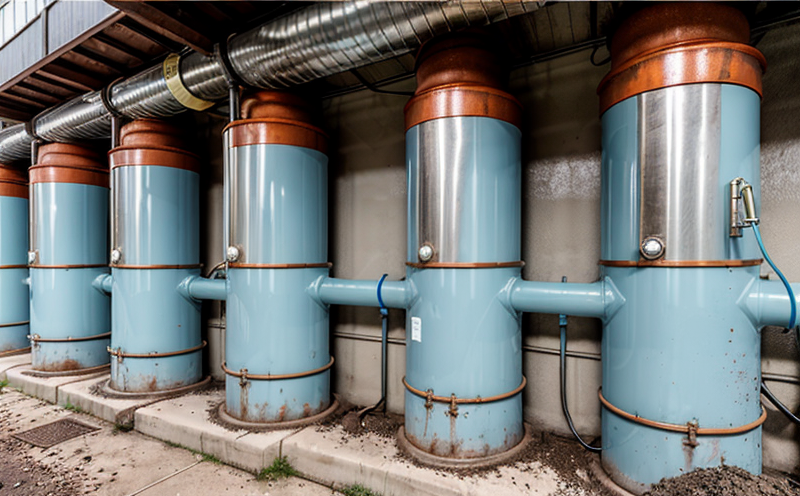ASTM D1126 Hardness Calcium and Magnesium Test in Water Validation Method Development Test
The ASTM D1126 hardness test is a critical method used to determine the total dissolved mineral content of water, specifically focusing on calcium and magnesium ions. This test is essential for industries reliant on water quality such as pharmaceuticals, food processing, power generation, and manufacturing sectors that use water in their processes.
Water hardness can significantly impact the performance and longevity of equipment used in these industries. High levels of calcium and magnesium can lead to scaling, which reduces heat transfer efficiency in boilers, clogs pipes, and accelerates wear on mechanical components. Understanding and validating the hardness of incoming water is therefore crucial for maintaining operational efficiency and ensuring compliance with regulatory standards.
The ASTM D1126 test measures total hardness by titrating a sample with EDTA (Ethylene Diamine Tetraacetic Acid) until a color change occurs, indicating that all the calcium and magnesium ions have been precipitated. The amount of EDTA used is then correlated to the concentration of calcium and magnesium in the water.
The reliability of this test is paramount for industries where even slight variations can lead to costly operational disruptions or regulatory non-compliance. Validating a method development process ensures that the analytical results are accurate, precise, and reproducible. This validation involves several steps including method selection, calibration, linearity assessment, accuracy checks, precision studies, and robustness evaluation.
At Eurolab, our experienced team specializes in developing and validating such tests for various industries. We employ state-of-the-art instrumentation and adhere strictly to international standards like ASTM D1126 to ensure the highest quality of results. Our services include not only conducting these tests but also providing detailed reports that can inform critical decisions regarding water quality management.
The process begins with careful selection of appropriate reagents and equipment, ensuring they meet stringent quality control measures. Calibration solutions are prepared according to specified concentrations, and standard operating procedures (SOPs) are followed meticulously during each step of the analysis. Linearity assessments demonstrate that the method can accurately measure hardness over a wide range of concentrations.
Accuracy checks ensure that the results align closely with known reference values under controlled conditions. Precision studies confirm that repeated measurements yield consistent results, which is essential for reliable data interpretation. Robustness evaluations show how minor variations in experimental conditions do not affect the final outcome significantly. This comprehensive approach guarantees robust method validation.
Our team stays updated on the latest methodologies and continuously refines our practices to incorporate new insights from ongoing research. By leveraging advanced analytical techniques and adhering strictly to recognized standards, Eurolab ensures that every service provided meets or exceeds industry expectations. Our commitment to excellence makes us a trusted partner for companies seeking to optimize their water management strategies.
Why It Matters
The importance of ASTM D1126 hardness testing extends beyond mere compliance; it plays a pivotal role in safeguarding the integrity and efficiency of industrial processes. In pharmaceutical manufacturing, for instance, water hardness directly influences drug product quality by affecting solubility and stability.
- Water hardness can precipitate certain compounds, leading to potential contamination issues,
- It may also influence dissolution rates of active ingredients,
- Critical for ensuring consistent performance across batches.
In food processing, maintaining water quality is vital for preserving product safety and shelf life. High mineral content in water can cause off-flavors or alter the texture of processed foods, impacting consumer satisfaction.
- Water hardness impacts the effectiveness of cleaning agents,
- Precipitation of minerals during sterilization processes,
- Affects the taste profile of beverages and dairy products.
For power generation facilities, water quality is critical for efficient operation. Scaling in steam generators can lead to increased fuel consumption, reduced efficiency, and higher maintenance costs.
- It also poses risks of equipment failure,
- Potential shutdowns due to operational inefficiencies.
In manufacturing environments where water is used extensively, ensuring optimal hardness levels prevents costly repairs and downtime. By accurately measuring calcium and magnesium content, industries can implement targeted treatment strategies aimed at minimizing scaling, corrosion, and other harmful effects.
Eurolab Advantages
EuroLab offers a range of advantages that set us apart as the preferred partner for ASTM D1126 hardness testing. Our expertise lies in providing comprehensive validation services tailored to meet specific client needs. With our state-of-the-art laboratory facilities and experienced technical staff, we ensure accurate and reliable results every time.
Our commitment to quality is reflected in our adherence to international standards such as ASTM D1126. This ensures that all tests conducted are not only precise but also universally accepted within the industry. Our team of qualified professionals stays updated on the latest developments in water testing methodologies, allowing us to offer cutting-edge solutions.
We pride ourselves on delivering timely results without compromising on accuracy or completeness. Each project is handled with care and attention to detail, ensuring that clients receive reports that are both informative and actionable.
In addition to our technical capabilities, EuroLab also emphasizes transparency throughout the testing process. Clients have access to detailed documentation detailing every aspect of the validation study. This includes raw data, method descriptions, calibration curves, and final results. Transparency fosters trust between us and our clients, enabling better decision-making processes.
Our flexible approach allows us to accommodate various project requirements while maintaining high standards of service. Whether you need assistance with initial method development or routine validation studies, EuroLab is here to support your needs effectively.





